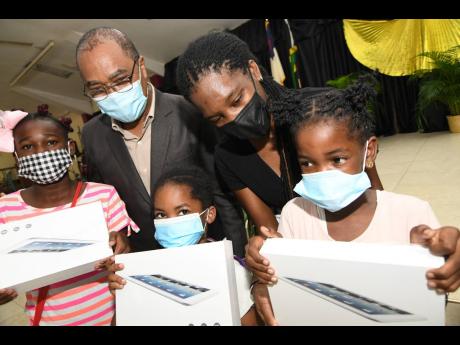Pastor warns of lost school generation
The failure of the Jamaican State to roll out broadband width that is reliable, affordable, and accessible to poor inner-city students will come back to haunt the country, with fears of a lost generation of schoolchildren.
That is the dire warning from the Rev Dr Stevenson Samuels, a church leader who has ministered in Kingston’s gritty communities for years.
Speaking with The Gleaner on Sunday at the Waltham Park New Testament Church of God, which he pastors, Samuels forecast gloom for many students who have been displaced by the COVID-19 pandemic and disadvantaged by inadequate access to technology.
Samuels said he was particularly concerned about the widening social divide triggered by learning loss as “lots of kids in low-income communities ... are just running up and down on the road”.
“When the pandemic is over, a lot of our children who we think are in grade three, they are going to be really functionally in grade one. We are going to have a challenge in this country, in fact around the world, but we are concerned for Jamaica.”
Stevenson’s comments are against the background of a slow and steep learning curve for children who have been out of the classroom for most of the last 14 months after the new coronavirus was detected here.
A stop-start academic year, with schools having to shutter because of infection surges on their compounds or in the wider society, has contributed to fatigue, leaving many teachers and students behind in their curricula.
That an estimated 120,000 students have been out of touch with schools has made the crisis even more grave.
The Holness administration has distributed thousands of laptops and tablets since the onset of the pandemic and has pledged to underwrite extra classes to close the learning gap.
Education Minister Fayval Williams has also floated the extension of the school year, a proposal that has been rejected by the Jamaica Teachers’ Association.
But Stevenson, whose church held a service capping Child Month, charged the Government to do more to level the playing field.
SATURATE COMMUNITIES
Saturating inner-city communities with social workers to monitor schoolchildren would be a practical first step in halting the educational slide, he said.
“It is one thing to have the online offering, but it’s another to ensure that the offering that is being given is being taken up by real children around a tablet or a device looking on. What we really need now is for workers to be in the communities, ensuring that children are engaged,” the pastor said.
Stevenson added: “I think, too, that we need to do all we can to find public spaces in communities where we can establish centres that children can go to. So I think places like here (at the church), for instance, maybe we need to be nudged a little more, encouraged and even facilitated to ensure that there is a lab or cyber centre for children who can’t access the Internet at home.”
The Universal Service Fund (USF), the Government’s vehicle for building out broadband infrastructure, has been criticised for failing in its mandate to provide Internet access in underserved rural communities.
Among its fiercest critics has been Stephen Price, FLOW’s country manager, who said, earlier this month, “There is still a lot of work to be done to bridge the digital divide.”
The USF has committed to offer at least three communities in each of the country’s 63 constituencies Wi-Fi service, Technology Minister Daryl Vaz said in his Sectoral Debate presentation earlier this month.
Vaz said that 189 locations would be identified and equipped.
Ten tablets were donated on Sunday to nine students from Waltham Park New Testament Church’s Sunday school circuit as well as to a child at Penwood High.
Besides a needs assessment, the beneficiaries were selected by a church committee based on their attendance at Sunday school and participation in activities.

